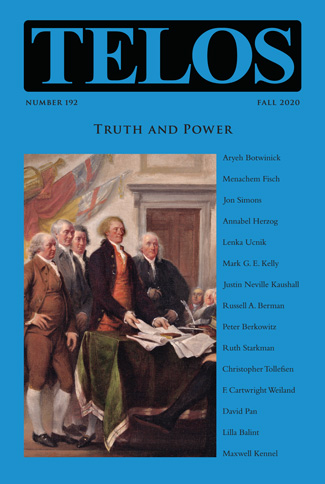In today’s episode of the Telos Press Podcast, Camelia Raghinaru talks with Aryeh Botwinick about his article “Negative Theology, Power, and the Israeli–Palestinian Conflict,” from Telos 192 (Fall 2020). An excerpt of the article appears here. If your university has an online subscription to Telos, you can read the full article at the Telos Online website. For non-subscribers, learn how your university can begin a subscription to Telos at our library recommendation page. Purchase a print copy of Telos 192 in our online store.
|
In today’s episode of the Telos Press Podcast, Camelia Raghinaru talks with Mark G. E. Kelly about his article “Foucault and the Politics of Language Today,” from Telos 191 (Summer 2020). An excerpt of the article appears here. If your university has an online subscription to Telos, you can read the full article at the Telos Online website. For non-subscribers, learn how your university can begin a subscription to Telos at our library recommendation page. Purchase a print copy of Telos 191 in our online store. Telos 192 (Fall 2020): Truth and Power is now available for purchase in our store. Individual subscriptions to Telos are also available in both print and online formats.
First, there are natural scientific truths that even autocrats and totalitarians do not seek to deny, as they are the source of the technological tools that can support any attempt to maintain power. Here, there is certainly no conflict between truth and power. Not only does political power depend on technological achievement, but natural scientific facts cannot be covered up by lies and ideology for long. Consequently, political actors must pay attention to natural scientific and technical knowledge, even if they then instrumentalize it in different ways. As an occasional feature on TELOSscope, we highlight a past Telos article whose critical insights continue to illuminate our thinking and challenge our assumptions. Today, Erik Pomrenke looks at Andrew J. Mitchell’s “Entering the World of Pain: Heidegger” from Telos 150 (Spring 2010). Heidegger’s thinking of pain allows for a positive revaluation of pain as openness, not closure, to the world. Andrew J. Mitchell contends in his “Entering the World of Pain: Heidegger,” that “pain is the surest sign that we wholly belong to this world; in fact, pain is nothing other than our contact with the world and our ‘openness’ to it.” Mitchell situates Heidegger against two popular accounts of pain: Freudian psychoanalysis and the humanist interpretation of pain as articulated by Elaine Scarry in her book The Body in Pain. Both models oppose pain and openness to the world and therefore see pain as a withdrawal from meaning. Within psychoanalysis, this takes place in the disengagement of cathexis—divestment of libido from love objects. Within the broadly humanist account, world and body are opposed. When the body demands attention, it necessitates a withdrawal from and contraction of the world. Scarry’s thought is structured by such binary oppositions as pain and meaning, interiority and exteriority, and it will be the task of Heidegger’s thinking of pain to reconfigure these oppositions by holding up pain and language as co-original phenomena—a task that Mitchell illustrates by reading Trakl. For many today, Claude Lefort is a thinker known mainly by association, someone whose work emerges where others are asked to situate their projects relative to his thinking of the political. He is a prominent, if not central, figure for the more post-structuralist thinkers of radical democracy. Lefort’s sense of democracy—as that form of society where the place of power is empty—is vital to those projects that would likewise tie democracy to the symbolic character of power, and to the distinct workings of politics and the political. Interestingly, while debate over the correct translation of le or la politique seems to almost always return to Lefort, it remains the case that for his own part Lefort was never much interested in post-structuralism. For him, the post-structural turn, itself bound up with the legacies of May 1968 and the new knowledge, obfuscated almost as much as it made clear. The definition of asymmetry in asymmetrical warfare could, it seems, contribute to illuminating the link between war and politics, or war and peace. For Clausewitz, “War is a simple continuation of politics by other means.” Now, we could ask: what is the politics of asymmetrical warfare? Still following Clausewitz, war is “a wide-scale duel” and, as a duel or fight, war “takes two distinct forms: attack and defense.” Additionally, for Clausewitz, politics would be a form of “wide-scale commerce” between states. In his book Drone Theory, the French philosopher Grégoire Chamayou defines asymmetrical warfare as cynegetic (in other words, a form of hunt). He uses as an illustration the name of a recent model of unmanned vehicle: “the Predator,” le prédateur. But how can asymmetrical warfare be considered as war if the fight dynamic is absent? And if asymmetrical warfare is a manhunt, how could politics as commerce be possible? |
||||
|
Telos Press Publishing · PO Box 811 · Candor, NY 13743 · Phone: 212-228-6479 Privacy Policy · Data Protection Copyright © 2024 Telos Press Publishing · All Rights Reserved |
||||








